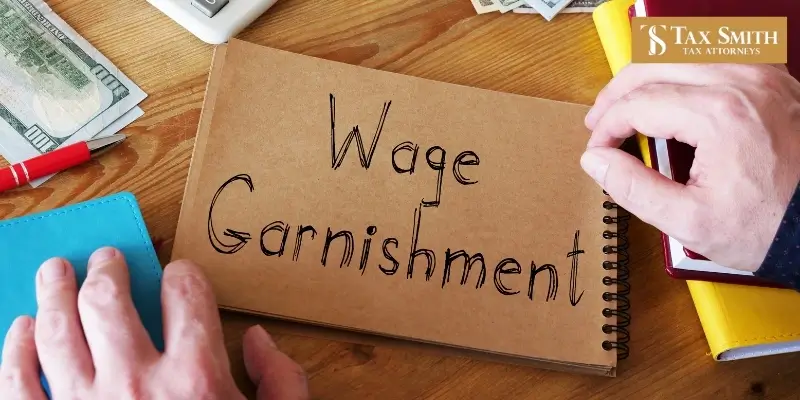|
|
Last Modified on Jun 19, 2025
Whether your wages have been garnished by a commercial creditor, the court, or the Internal Revenue Service (IRS), it can cause serious financial hardship. It’s hard to support yourself and your family, especially if you rely on the entire amount of each paycheck. There are options available. It’s important to know how to stop wage garnishment immediately in Florida.
What Are Your Options for Stopping Wage Garnishment?
The most effective way to stop wage garnishment is to pay back the creditor. When you pay the full amount of your debt, the garnishment will end when the creditor receives and processes the payment.

Wage garnishments are a frequent tool used by many creditors to recover the debt they are owed. The IRS sent out almost 314,000 requests in 2024 to third parties, such as banks and employers, to place levies. There may also be additional actions, such as levies or liens. When you don’t have the financial ability to pay your full debt, you may have other options to address it and avoid or limit wage garnishment. These options include:
- Negotiating a Lower Garnishment Amount: You could directly get in contact with the creditor that placed the garnishment and try to negotiate the garnishment itself. You could request that the percentage they remove from your paycheck be lower. Working with an attorney can help you prepare for these negotiations. Your attorney can even represent your interests.
- Challenging the Wage Garnishment in Court: If creditors fail to follow the right steps prior to garnishing your wages, you can file to challenge their illegal garnishment. For creditors that must get court approval for the garnishment, instructions on how to challenge the garnishment will be included in the papers you are served. You have a limited period of time to file this challenge. The creditor may have provided inaccurate information, or the claim may be on wages that are exempt from garnishment. If your wages are already being garnished, you could challenge the garnishment of another creditor, depending on the circumstances.Challenging it may prevent the creditor from garnishing your wages or give you the necessary time. Talk your options over with an attorney.
- Applying for an Exemption: You can also file for an exemption from wage garnishment. This must also be filed in a short period of time after you receive notice of garnishment. If you fail to file for the exemption on time, your wages could be garnished even if you meet the requirements for exemption. In FloridaFlorida, the head of household exemption is a useful way to prevent most non-federal wage garnishments. You are considered the head of your household when you provide more than half of the support for a child or another dependent in your home. If your disposable weekly earnings are $750 or less, your wages cannot be garnished for those debts. Disposable earnings over this amount can be garnished, but only if you agree to the garnishment in writing.
- Negotiating Other Debt Settlement Options: You can negotiate with the creditor for other payment options, such as a payment plan or debt settlement. If your creditor is the IRS, their payment plan is called an installment agreement, and their debt settlement is called an offer in compromise. The IRS also has penalty abatement for first-time penalties and penalties with just cause. These settlement options allow you to lower the amount you owe, give yourself more time to pay the debt, or let you erase your debt for a lesser amount. It can also prevent collection actions like wage garnishment.
- Filing for Bankruptcy: You can file for bankruptcy and nearly immediately stop wage garnishment. However, this is not an action to be taken lightly. Garnishment will be paused due to the automatic stay placed by most types of bankruptcy, and these bankruptcies could also clear or limit the debt you owe, although it may not affect all types of debts. Filing for bankruptcy is an extreme choice, and the benefits and drawbacks should be reviewed with experienced legal representation.

FAQs About Stopping Wage Garnishment Immediately in Florida
How Can You Stop Wage Garnishment Fast?
The most effective way to stop wage garnishment fast is to pay off your debt in full. There are ways to negotiate with creditors to lower garnishment or find other methods of repayment, which may take longer. In extreme cases, you can immediately pause most garnishments by filing for bankruptcy, which places an automatic stay on your assets.
However, not all debts are cleared through bankruptcy, and you may have your wages garnished again after bankruptcy proceedings have been completed.
How Quickly Can Garnishment Be Stopped?
If your wages are being garnished by the IRS, they are required to release a wage or bank levy if:
- You paid your debt in full
- The collection period for the tax ended before the levy was issued
- The IRS determines that releasing the levy will help you pay what you owe
- You begin an installment agreement with terms to stop the levy
- The wage or other levy prevents you from meeting your basic needs
What Is the Florida Agreement to Waive Garnishment Protection?
The Florida agreement to waive garnishment protection is related to the head of household exemption. If you are considered the head of your household, and your disposable income is greater than $750 per week, you must agree in writing to any garnishment of your wages. This means you are protected from having your wages garnished, but you can waive this protection and agree to a garnishment amount to pay off your debts.
How Do You Request a Payment Plan to Stop a Wage Garnishment?
You can contact the creditor directly to request a payment plan or work with an attorney to contact them. In some cases, you may need to contact a debt collection agency. If your creditor is the IRS or state tax agency, you can contact them to create an installment agreement or find other methods to settle your debt, including an offer in compromise. In the fiscal year 2024, the IRS accepted almost 7,200 offers in compromise.
Work With a Dedicated Wage Garnishment Lawyer
At TaxSmith, LLC, we can help you deal with wage garnishment and tax debt with the IRS or state tax agencies. We help you review your financial circumstances and make important choices about how to handle wage garnishment and address it quickly. Contact our firm today.








